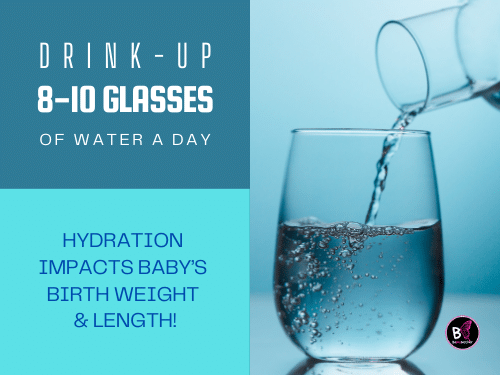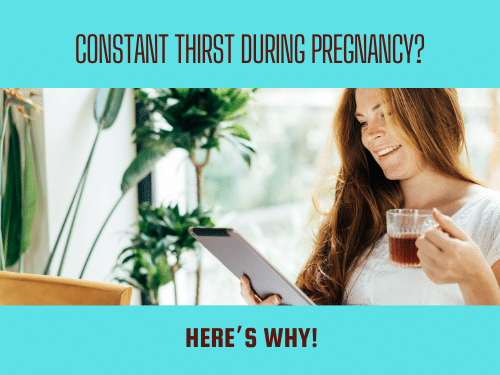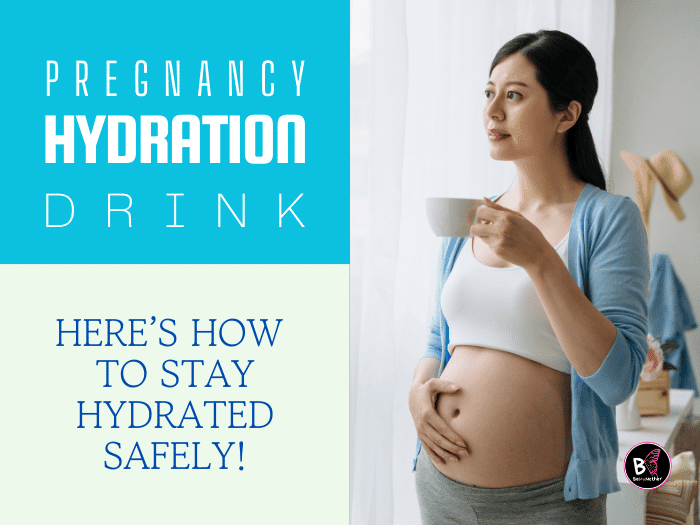📌 Quick Answer: Water is the best pregnancy hydration drink, but coconut water, herbal teas, natural fruit juices, and homemade electrolyte drinks can also help. Pregnant women should aim for 8-12 cups (64-96 oz) of fluids daily to prevent dehydration and support fetal development.
Hydration is crucial during pregnancy, as it impacts amniotic fluid levels, circulation, and digestion. Many expectant mothers wonder which hydration drinks for pregnancy are safe and what fluids to avoid. This guide explores the best hydration drinks for pregnancy, signs of dehydration, and how to stay hydrated effectively.
1. Pregnancy Hydration Drink: Why Staying Hydrated is Essential
Water plays a vital role in pregnancy, ensuring nutrient transportation, waste elimination, and proper fetal development.
Why Hydration Matters During Pregnancy
✔ Supports amniotic fluid levels for fetal protection.
✔ Helps prevent constipation and urinary tract infections (UTIs).
✔ Regulates body temperature and prevents overheating.
🔍 Research Insight: A study in the Journal of Nutritional Science found that dehydration during pregnancy can affect birth weight and length in newborns.
Source: Effect of dehydration during pregnancy on birth weight and length
💡 Tip: Always carry a reusable water bottle and drink fluids consistently throughout the day.
2. What Hydrating Drinks Are Safe During Pregnancy?
The best hydration drinks for pregnancy include:
✔ Water – The best and safest option.
✔ Coconut Water – A natural electrolyte drink.
✔ Herbal Teas – Ginger and peppermint tea help with nausea.
✔ Milk – Provides calcium and hydration.
✔ Homemade Fruit Juices – Opt for fresh juices with no added sugar.
Drinks to Avoid
❌ Sugary sodas – Lead to excess weight gain.
❌ Caffeinated drinks – Excess caffeine may increase miscarriage risk.
❌ Energy drinks – High in sugar and artificial ingredients.
💡 Fact Check: Water-based foods like cucumbers, oranges, and watermelon also contribute to hydration levels.
💡 Related Article: Confused about which fizzy drinks are safe during pregnancy? Uncover the facts about Olipop and other beverages in Is Olipop Safe for Pregnancy? What Studies Say + 8 Drinks to Enjoy or Avoid, ensuring you make informed choices for a healthy pregnancy.
3. How Much Water Should I Drink While Pregnant?

Pregnant women should aim for 8-12 cups (64-96 oz) of fluids daily. However, individual hydration needs depend on activity levels, climate, and diet.
| Trimester | Recommended Fluid Intake |
| First Trimester | 8-10 cups (64-80 oz) |
| Second Trimester | 10-12 cups (80-96 oz) |
| Third Trimester | 10-12 cups (80-96 oz) |
Listening to your body is also crucial; thirst is a sign that you need to drink more water. However, during pregnancy, it’s essential not to wait until you’re thirsty. Regularly sipping on water throughout the day can help prevent dehydration
🔍 Research Insight: Drinking 8-10 glasses of water per day is recommended for healthy pregnant women.
Source: (PDF) Nutrition Column: An Update on Water Needs During Pregnancy
💡 Tip: If you’re physically active or live in hot climates, increase water intake to prevent dehydration.
4. Signs of Dehydration in Pregnancy and How to Prevent It

Dehydration can cause serious complications like preterm labor and neural tube defects.
Common Signs of Dehydration
✔ Dry mouth and lips
✔ Dark yellow urine (hydrated urine should be pale yellow)
✔ Dizziness and headaches
✔ Fatigue and low energy
🔍 Research Insight: A study from Penn State University found that pregnant women often become underhydrated in the second and third trimesters due to increased water output.
Source: Hydration Can Impact Pregnancy and Birth Outcomes
💡 Tip: Set hourly reminders to drink water or flavor water with lemon and mint to make it more enjoyable.
5. Natural and Electrolyte-Rich Pregnancy Hydration Drinks

How to Make Electrolyte Water at Home | Healthy Habits
Electrolyte drinks help maintain hydration levels, especially if experiencing morning sickness or excessive sweating.
Best Natural Electrolyte Drinks for Pregnancy
✔ Homemade Electrolyte Water: Mix 1 liter of water, ½ tsp salt, a squeeze of lemon and a touch of honey.
✔ Coconut Water: Provides potassium and magnesium for hydration.
✔ Oral Rehydration Solution (ORS): Useful for dehydration due to vomiting or diarrhea.
🔍 Research Insight: A study published in Nutrients found that higher fluid intake was associated with better amniotic fluid levels.
Source: A Study of the Fluid Intake, Hydration Status, and Amniotic Fluid Index in Pregnant Women
💡 Tip: Avoid store-bought sports drinks with added sugars and artificial colors.
💡 Related Article: Want to enhance your hydration but unsure about the safety of hydration multipliers? Explore the key facts about Liquid I.V. and its suitability during pregnancy in Is Liquid IV Safe During Pregnancy? Unveil 8 Key Facts for a Stronger Pregnancy, helping you stay hydrated effectively and safely.
6. Hydration Tablets for Pregnancy: Are They Safe?
Hydration tablets are effervescent supplements that dissolve in water to provide electrolytes.
Are They Safe for Pregnant Women?
✔ Safe if doctor-approved
✔ Helpful for severe dehydration or morning sickness
✔ Choose sugar-free options
⚠ When to Avoid:
❌ Tablets containing artificial sweeteners, caffeine, or high sodium.
❌ Self-prescribing – Always consult a healthcare provider before using supplements.
💡 Fact Check: Hydration tablets should not replace regular water intake, but they can be helpful in cases of dehydration.
💡 Related Article: Concerned about maintaining electrolyte balance during pregnancy? Find out if LMNT is a safe and effective option in Is LMNT Safe for Pregnancy? 10 Essential Facts Every Mother Should Know, and get the essential information you need for a healthy hydration strategy.
7. What Not to Drink During Pregnancy? Beverages to Avoid
Some drinks may pose risks to pregnancy and should be limited or avoided.
| Beverage | Why to Avoid |
| Energy Drinks | High caffeine, sugar, and artificial additives |
| Alcohol | Increases risk of fetal alcohol syndrome |
| Sugary Juices | Causes gestational diabetes risk |
| Unpasteurized Milk or Juice | Can contain harmful bacteria |
💡 Tip: Always check labels for hidden sugars and additives in store-bought beverages.
💡 Related Article: Enjoying a warm cup of chai but worried about its effects during pregnancy? Discover what’s safe and what to avoid in Is Chai Tea Safe During Pregnancy? 8 Unavoidable Facts for a Safe and Healthy Pregnancy, so you can make the best choices for you and your baby.
8. Why Am I So Thirsty During Pregnancy? Causes and Solutions

Feeling constantly thirsty? It’s normal due to hormonal changes, increased blood volume, and fetal fluid needs.
Common Causes of Increased Thirst
✔ Increased blood production – More fluids needed for circulation.
✔ Fetal needs – Amniotic fluid must remain at optimal levels.
✔ Gestational diabetes – Excessive thirst can be a symptom (consult a doctor).
💡 Tip: Drinking small amounts consistently throughout the day is more effective than chugging large amounts at once.
FAQ Section: Answering Common Questions About Pregnancy Hydration Drinks
Q1: What is the best pregnancy hydration drink?
A1: Water is the best option, but coconut water, natural fruit juices, and homemade electrolyte drinks are also great choices.
Q2: Can I drink ORS daily during pregnancy?
A2: Yes, but in moderation and under medical guidance, especially if experiencing vomiting or diarrhea.
Q3: How do I make a homemade rehydration drink?
A3: Mix 1 liter of water with 6 teaspoons of sugar and ½ teaspoon of salt. Add lemon for natural electrolytes.
Q4: Is 2 liters of water a day enough during pregnancy?
A4: Pregnant women typically need 2.5-3 liters (8-12 cups) of fluids daily.
Q5: Can I drink Sprite while pregnant?
A5: An occasional Sprite is fine, but avoid frequent consumption due to high sugar and caffeine.
Conclusion: The Best Pregnancy Hydration Drink for a Healthy Pregnancy
Hydration is crucial during pregnancy for both maternal and fetal health. Water is the best choice, but coconut water, herbal teas, and homemade electrolyte drinks can also help. Understanding the importance of pregnancy hydration drinks, choosing the right beverages, and recognizing the signs of dehydration can ensure a healthier and more comfortable pregnancy journey. Remember to consult with your healthcare provider for personalized advice and guidance.
💡 Final Tip: Listen to your body! If you feel thirsty, drink up and stay ahead of dehydration for a healthier pregnancy.



